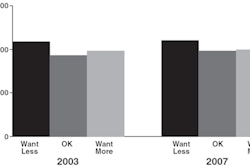
Fear of rising healthcare costs is being exploited to attack exclusive agreements and stipend support from hospitals to hospital-based physicians.
 |
| Healthcare business and legal affairs expert Mark F. Weiss. |
Although the attack by a Texas state legislator, as reported in the Dallas Morning News on Monday, January 25, 2010, was directed at an anesthesia deal, it is equally pertinent to exclusive radiology agreements and stipend support from hospitals to radiology groups. The legislator's claim: Exclusive contracts are noncompetitive and are one of the main culprits in the high cost of healthcare.
It would be easy, and dangerous, to write off the attack as the populist pandering of a petty politician -- re-elect me, something must be done! As we know from the past year of national healthcare "reform" wrangling, physicians, hospitals, pharmaceutical manufacturers, and insurers are commonly portrayed as "greedy," when on rational grounds, the greed is properly attributable to those who want to take your services and redistribute them to others for the distributor's political advantage.
But playing to fears makes for good sound bites. And, hospital administrators might attempt to take advantage of the same arguments, to gain leverage in their negotiations with you:
In this political climate, you're lucky that we're willing to take the heat from granting you an exclusive contract, but there's no way we can justify paying stipend support. Sure, we understand that you need to pay your group's radiologists to provide us with the 24/7/365 coverage we demand, but certainly the need to control costs for both the insured and the 47 million uninsured outweighs the needs of your 30 wealthy physicians.
Well-managed radiology groups must be prepared to address the arguments being made against exclusive contracts and coverage stipend support -- to do so requires that you understand the rationale supporting exclusivity and financial assistance.
Just as in a martial arts maneuver in which the opponent's force is turned against him, you must strive to expose these populist attacks as empty retorts to a highly beneficial arrangement for all parties involved -- radiologists, hospitals, patients, and payors.
Understanding the attack
The populist argument goes as follows:
- Competition is good and it reduces prices.
- Multiple radiologists practicing independently at a hospital compete for cases, leading to lower prices.
- Allowing a group to hold an exclusive contract, and, therefore, to prevent other radiologists (that is, competitors) from rendering services at the hospital allows one group to control pricing. That leads to higher prices.
- Hospital coverage stipends increase the hospital's cost of business, therefore leading to higher prices.
- Accordingly, exclusive contracts and hospital stipends should be prohibited.
In support of exclusive contracts and stipends
The attackers ignore that a hospital's purpose in entering into an exclusive contract is not to perform an act of kindness toward one group or to grant it a monetary favor, but is to assure that the hospital obtains coverage 24 hours a day, seven days a week, 365 days a year.
Prior to exclusive contracts, when radiology departments were open staffed, department membership, and, therefore, the right to work, was available to any radiologist who met credentialing requirements. Without a business structure linking the department's independent physicians, there was no mechanism by which the hospital could obtain a commitment that those independent physicians would always be available to provide services when needed.
Prior to the existence of radiology groups tied together by way of a business relationship, there was no way to ensure that all patients would be cared for equally, or even cared for at all. There was simply no mechanism to enforce charity care, or, for that matter, the availability of a radiologist for a case with poor reimbursement.
Without the existence of a financially integrated business entity, there was no way, absent violation of antitrust laws, for the physicians, each of whom was operating an independent practice, to jointly contract with a managed care payor or even to discuss among themselves coordinating their contracting at the same rate. Yet the hospital's need was to ensure coverage all of the time for all of the patients and to make certain that no patient was charged differently in comparison to another patient with the same healthcare coverage.
Of course, all of this led to the formation of groups and to exclusive contracts. The impetus was not that of entrepreneurial physicians who desired to form groups; rather, the impetus was pressure from the hospital to obtain the benefits of assured coverage at a price standardized by payor -- hospital pressure led to the formation of radiology groups.
The formation of groups in response to these business needs and, importantly, in response to the need to comply with antitrust laws, and the resulting exclusive arrangements between those groups and hospitals did not do away with competition, it shifted it from the individual provider level to the group level.
The attackers' argument ignores the fact that although competition for contracts is at the group level, the competition among groups for the services of individual radiologists is on the provider level. A regional, and often even more geographically specific, market exists for radiologists' services -- just ask anyone who is trying to recruit two providers, one to a large metropolitan area and the other to a small, agricultural community. Unless the group can pay at or above the relevant market's rate, it will neither be able to recruit nor retain its physician staff. If the income resulting from providing services, due to the facility's payor mix, is insufficient to pay its physicians at those market rates, the only solution short of a financial death by a thousand cuts (actually, by a thousand cases) is financial support from the hospital.
Lastly, the attackers ignore that payment for physician services is largely dictated by the payor, not by the group, and that hospital stipend payments have little to no impact on the scope of reimbursement received by the facility for the related technical services.
Every which way
Those making political attacks on exclusive contracts and coverage stipends can't have it every which way: They want charity care and they want physicians to work for low governmental program and managed care rates. They want the assurance that one patient is not charged more than another patient within the payment class. Yet they also demand compliance with antitrust laws that, in turn, require the existence of a financially integrated group.
They pass antikickback laws, prohibitions on "self-referral," and impose private remuneration restrictions on nonprofits, mandating that no more than fair market value be paid, therefore acknowledging that there is a market -- yet they ignore the fact that fair market rate coverage stipends must be paid by a hospital to permit its contracted radiology group to recruit and retain radiologists to provide the around-the-clock available, facesheet neutral coverage the hospital requires and the politicians demand.
Two simple analogies
Imagine the Texas legislator's chagrin if he and his family checked into a hotel and took two identical rooms for a one-week stay. After the first night, room one was cleaned but room two wasn't, as the housekeeper scheduled to that room decided to take an early lunch. Identical breakfasts were ordered for each room on day three, but the ham and eggs delivered to room two cost 43% more, as the chefs working in the kitchen each had their own independent pricing policy.
Would the legislator make a stump speech calling for more independent competition among the staff of a hotel, or would he write a letter of complaint to the manager?
Imagine that the firefighters in the Texas legislator's hometown were paid only for their actual efforts in fighting fires, not for preparing or for training or for waiting around until a call arrives, and if when they were paid, they would receive only what the owners or insurers of the burning houses would pay. Would the firefighters agree to be tethered to the station? Would they quickly look for better opportunities? Would the town be able to recruit new firefighters?
Would the legislator make a stump speech branding the firefighters as greedy -- they want to be paid to ensure their availability, or would he urge the town council to supplement the firefighters' income?
Well Mr. Legislator, the hotel is actually a hospital, and the hospital is on fire. The choice is not whether or not to grant an exclusive contract or whether or not to pay a stipend; it's whether or not to have radiology coverage and, therefore, a functioning facility.
More than knowledge required
I stated above that well-managed radiology groups must be prepared to address the arguments being made against exclusive contracts and coverage stipend support and that doing so requires that they understand the rationale supporting exclusivity and financial assistance.
But the reality is that the best groups, the strategic groups, will be proactively engaged in countering these mistaken assumptions well before the face-to-face stage of negotiations on their next exclusive contract begins -- this takes preparation and time and effort. In other words, it's not enough to simply know what to argue in opposition to these attacks; your group must develop, as a part of its ongoing business strategy, the tactics required to co-opt the argument from the start.
By Mark F. Weiss
AuntMinnie.com contributing writer
February 19, 2010
Mark F. Weiss is an attorney who specializes in the business and legal issues affecting radiology and other physician groups. He holds an appointment as clinical assistant professor of anesthesiology at University of Southern California's Keck School of Medicine and practices nationally with the Advisory Law Group, a firm with offices in Los Angeles and Santa Barbara, CA. Mr. Weiss provides complimentary educational materials to our readers. Visit www.advisorylawgroup.com for his free newsletter. He can be reached by e-mail at [email protected].
Related Reading
The Profit Center: Part 11 -- Thriving despite (so-called) healthcare reform, January 13, 2010
The Profit Center: Part 10 -- Taking on risk with dubious reward, January 4, 2010
The Profit Center: Part 9 -- Securing customer satisfaction, November 11, 2009
The Profit Center: Part 8 -- Deploy the power of persuasion, October 30, 2009
The Profit Center: Part 7 -- Increase negotiating power by controlling context, September 11, 2009
Copyright © 2010 Mark F. Weiss



















